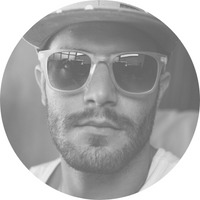Number three is equalization. Since water is much heavier than air, all the airspaces in our body are gonna start shrinking, as soon as we start diving down. That means our mask, our sinuses, our respiratory system and our middle ear, is gonna start to compress,it's gonna get smaller, it's gonna shrink as we start diving down and it's gonna continue doing it. So we need to learn how to compensate this pressure in a relaxed and efficient way. There are different techniques like valsalva, hands-free... Let's focus on the most famous one, more common one, that is really going to help you improve your beginner technique and your advanced technique in the future and it's called the frenzel technique.
So what we want to look for this, what is happening with the frenzel technique is that we disengage our chest and our diaphragm, we close the gate here and we're gonna use the larynx as a pump to create and push air up, ok? What we need to do next is pinch our nose and seal our mouth in a comfortable way. After this, when we create the pressure and push it up, this is gonna send the air through those tubes, right in the middle ear and therefore we're gonna be able to equalize. We need to practice not only in the water, we need to practice dry, you can try with different positions, like with a handstand and then pressing with a nose clip or with different long volumes, like after a passive exhale, or even a full exhale and get familiar with this sensation. Another important tip, make sure you find the proper center or freediving instructor, because they're gonna help you to fix your problems easier and help you advance in a more efficient way.

 Nick Pelios
Freediver, Creator
Nick Pelios
Freediver, Creator

 Nick Pelios
Freediver, Creator
Nick Pelios
Freediver, Creator